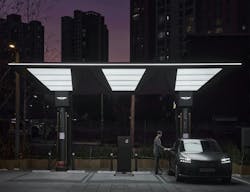Morphosis designs EV charging station for automaker Genesis
With stations completed this month throughout South Korea’s most populated province, Gyeonggi-do, LA-based design and architecture firm Morphosis has partnered with automotive luxury brand Genesis to bring their signature brand and styling, attention-to-detail, and seamless customer experience to the design of Electric Vehicle Charging (EVC) Stations. The first phase of domestic deployment includes five sites throughout South Korea’s most populated metropolitan zones: Seoul and Gyeonggi-do, including stations in Genesis’ flagship showrooms, Suji and Gangnam, as well as other locations in Seoul and Goyang. The canopies are designed to be modularized and replicated in future expansions within Korea and beyond.
“From design concept to the smallest crafted detail, the defining design identity of the Genesis brand are materialized in the charging stations: the wing emblem, the two lines and the Athletic Elegance,” says Morphosis Design Partner Ung-Joo Scott Lee. “As leaders in both design and mobility, we are inspired to imagine new ways of thinking about the infrastructure needed for charging electric vehicles while providing Genesis new opportunities to connect and support its customers as we enter into the era of full vehicular electrification.”
Strategically Designed EVC Stations
The exterior EVC Stations are designed to serve as protective canopies made of aluminum panels on a steel superstructure. The winged form of the canopy is instantly recognizable within the urban environment, with a lightness and elegance that evokes the distinctive Genesis wing emblem and Genesis’ core design identity of “Athletic Elegance.”
The razor-thin canopy edge integrates a continuous LED light feature identifying the charging stations, with future capability of changing colors to indicate the electric vehicle charging level. The stations encompass a range of indoor and outdoor adaptations to respond to different climates and site conditions.
To address the unique existing conditions at each interior location, the design introduces a set of recognizable surfaces and forms identifying the EVC locations. The exterior canopies are designed in three different forms to accommodate different site parameters and requirements. “Double” and “triple” canopies accommodate additional chargers, allowing multiple vehicles to be charged at once. The new EVC stations are compatible with Genesis’ electric vehicles and the ultra-fast chargers can fully charge these vehicles in as little as 20 minutes.
